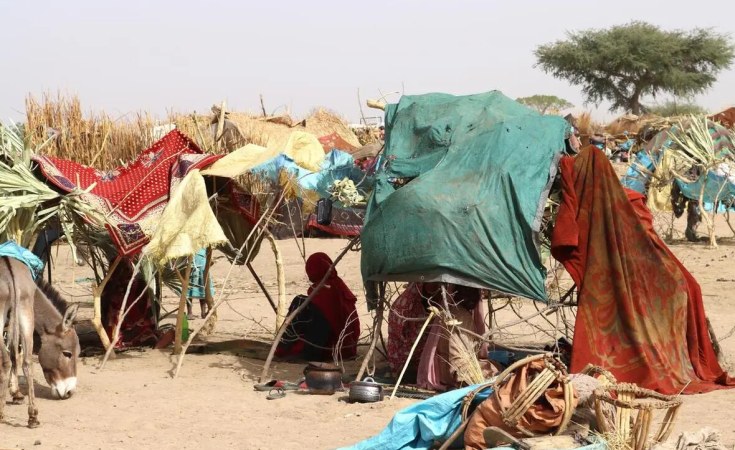Both the Sudanese army and the RSF paramilitary have accused one another of attacks, threatening a fragile cease-fire. Meanwhile, a Turkish evacuation plane came under fire, as missions continue. DW has the latest.
A fragile truce extended in the early hours of Friday has already shown cracks in Sudan, with both the army and the Rapid Support Forces (RSF) paramilitary group slipping back into fighting and exchanging accusations of attacks.
Both groups had agreed to extend a 72-hour cease-fire as of early Friday, with US and Saudi mediation. The new cease-fire was meant to last for another 72 hours.
However, on Friday, the RSF accused the army, led by general Abdel Fattah al-Burhan, of attacking RSF bases in Jebel Aulia and Omdurman with airstrikes. The paramilitary group said the attacks stalled the movement of diplomatic missions evacuating their citizens.
The RSF, led by Mohamed Hamdan Dagalo, said the truce violations "confused citizens who largely depended on the humanitarian truce to move to safe zones and get their basic needs met."
The army meanwhile accused the RSF of attacking its forces in Jebel Aulia, saying it repelled a "failed" attack and destroyed many RSF vehicles.
It was not entirely clear whether, but appeared probable that, the two groups were referring to the same fighting in the same settlement. Jebel Aulia is roughly 40 kilometers (25 miles) south of the capital Khartoum, and like Khartoum is located on the banks of the White Nile.
Residents reported clashes in several areas in the capital, including the upscale Kafouri neighborhood, around the military's headquarters, the Republican Palace and the vicinity of the Khartoum International Airport, the French AFP news agency said.
Since the fighting began on April 15, many cease-fire agreements had been announced, with hardly any full cessation of fighting. However, the final cease-fire, brokered by the United States, allowed a lull in fighting which opened a window for further evacuations out of Khartoum and the whole of Sudan.
Here are other key headlines about the crisis in Sudan for Friday, April 28:
UN alarmed by prison breaks, impunity
The United Nations raised alarm bells on Friday at the repercussions of the violence gripping Sudan for two weeks, including recent prison breaks.
"We're very, very deeply alarmed by the prison breaks," UN rights office spokeswoman Ravina Shamdasani told reporters in Geneva. "We're very worried about the prospect of further violence, amid a generalized climate of impunity."
Reports of prisoners breaking free amid the security vacuum caused by the fighting have been rampant. Prisoners who escaped reportedly include allies of former ousted president Omar al-Bashir.
Shamdasani said the UN was concerned that jailbreaks symbolized a wider trend of impunity, which she said "emboldens the perpetrators."
She also expressed concern for the human rights situation which she said was deteriorating dramatically.
Shamdasani accused the RSF of removing people from their homes in densely populated areas in Khartoum.
Capital residents face as a result "looting, extortion, acute shortages of food, water, electricity, fuel, limited access to healthcare, limited communication and limited cash due to the closure of banks," she added.
At least 512 have been killed since the fighting started, with over 4,190 wounded.
Turkish evacuation plane attacked
A Turkish C-130 Hercules military transport plane was attacked with light weapons while en route to pick up Turkish citizens, the Turkish Defense Ministry said on Friday.
The ministry said the plane landed safely, with no injuries reported.
The Sudanese army had accused the RSF of carrying out the attack on the plane as it prepared to land at Wadi Sayidna airport. It had claimed that the attack destroyed the fuel container and injured one personnel.
The RSF was quick to dispel the accusation as "lies and claims," saying it had adhered to the cease-fire.
"The area [where the plane was attacked] doesn't fall under our forces' control and we have no forces in its vicinity," the paramilitary group said. It argued that the responsibility for the attack falls fully on the army.
More DW coverage of the conflict in Sudan
Chad is hosting more than 1 million people forced to leave their homes, including nearly 400,000 Sudanese refugees. Chad fears the conflict between rival army generals will pile more pressure on its limited resources.
Russian paramilitary group Wagner operates a gold processing plant in Sudan and has been accused of involvement in the country's recent conflict.
Sudan's neighbors are working to prevent an escalation of fighting in the region. Ethiopia is mediating through the African bloc, but experts say the neighbor in the Horn of Africa should take a stronger leadership role.
rmt/msh (AFP, Reuters)


